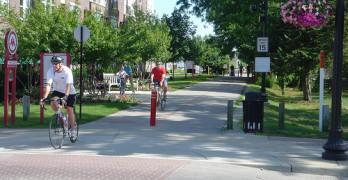
Carmel, Indiana is an upscale business suburb of Indianapolis that I’ve written about previously, noting them as a paradigm of the new aspirational suburb. Strong Towns and Charles Marohn have been critics of Carmel, mostly because of that city’s billion dollars in debt (on a population of 93,000).
I recently joined Chuck for an hour on the Strong Towns podcast for a conversation with him in which I give my mostly positive take on what Carmel is doing. It’s now posted over at the Strong Towns podcast. If the audio player doesn’t display for you, click over to listen on Strong Towns.
Here’s their description of our conversation:
Carmel’s gamble, Renn says, is a response to the Growth Ponzi Scheme that Strong Towns diagnoses, in which suburbs lose their allure after a generation, wealthy residents skip town for the next suburb out, and those older suburbs find themselves unable to pay for infrastructure maintenance and services. But rather than adopt the Strong Towns approach of incremental development, Carmel has gone the opposite direction. Renn summarizes the Carmel mindset:
“We are actually going to invest into producing actual high-quality, urban amenities, infrastructure, etc. while we are in our growth phase, so that when we are complete, we have an essentially unreplicable environment that will retain its allure in a way that these earlier generations [of suburbia] didn’t.”
Carmel’s bid is to permanently be a premier suburb of Indianapolis, and to offer the amenities that can attract a surgeon, a high-powered attorney, or an executive at a company like Eli Lilly. It’s also aiming to be a place that can compete with the lifestyle offered by upscale enclaves in coastal cities.
This piece originally appeared on Urbanophile.
Aaron M. Renn is a senior fellow at the Manhattan Institute, a contributing editor of City Journal, and an economic development columnist for Governing magazine. He focuses on ways to help America’s cities thrive in an ever more complex, competitive, globalized, and diverse twenty-first century. During Renn’s 15-year career in management and technology consulting, he was a partner at Accenture and held several technology strategy roles and directed multimillion-dollar global technology implementations. He has contributed to The Guardian, Forbes.com, and numerous other publications. Renn holds a B.S. from Indiana University, where he coauthored an early social-networking platform in 1991.












